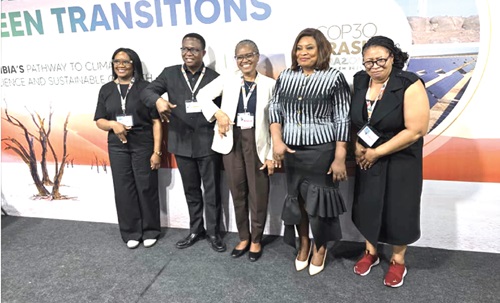Experts in climate financing have called on governments, particularly those in Africa, to get the private sector actively involved in the design and implementation of the nationally determined contributions (NDCs) policies to address climate change.
They said the involvement of strategic private sector players in designing and implementing the NDCs would ensure that the related policies were comprehensive enough to attract investors into the green space.
Those who made the call were the Global Head of Climate and Renewable Energy at KPMG, Mike Hayes; the Head of Sustainability at the Development Bank of Nigeria (DBN), Lolade Awogbade; and the Director of the Green Transition Office of the Jospong Group of Companies (JGC), Dr Glenn Kwabena Gyimah.
In a panel discussion held as a side event at the Ethiopian Pavilion at the ongoing 30th Conference of Parties (COP30) of the United Nations Framework Convention on Climate Change (UNFCCC) in Belem, Brazil, they stressed that the involvement of the private sector was the surest way governments could use the NDCs to drive investments in green projects.
The panel session was on the topic: "NDC 3.0: an investment vehicle for accelerating transition finance in Africa".
The NDCs
The NDCs are policy frameworks each UN-member country formulates, outlining efforts to reduce national emissions and adapt to the impacts of climate change.
The NDCs specify each country's plans for limiting global warming to 1.5°C, as established under the 2015 Paris Agreement.
As required by the UNFCCC, these documents must be updated and submitted every five years.
While some countries have submitted their updated NDCs (3.0), other countries, including Ghana, are in the final stages of developing the document.
One of the central issues dominating the discussions at COP30 is for NDCs 3.0, which represent the third round of country contributions to be progressive and more ambitious than the current NDCs.
Experts hold the view that NDCs 3.0 could be the last chance to put the world on a path towards a global emissions trajectory consistent with the Paris Agreement's 1.5 °C goal.
Private sector key
Within that context, Mr Hayes said given that the private sector would be pivotal in mobilising funds for green projects, it was important for governments to give the sector a voice in putting together the NDCs.
The climate change and decarbonisation leader stressed that when governments were thinking about how to implement the NDCs, they needed to bring the private sector on board to ensure that the policies were holistic.
"By the private sector, I mean three groups, namely developers, investors and the insurance industry.
If you involve them, it facilitates the development and implementation of sound fiscal policies because those private sector players have understanding of the economies in Africa," he said.
Additionally, he said, involving the private sector would help the government to design policies that could attract investment into projects.
He stressed that there must be good terms and conditions in the NDCs that facilitate foreign direct investments.
Private sector preparedness
While wholly agreeing that the government and the private sector must work closely to design the NDCs, Dr Gyimah stressed that players in the private sector needed to gird their loins to leverage opportunities in the green space.
He stressed that it was incumbent on the private sector to establish robust data collection system to make a business case.
Again, he said, the private sector must make it a point to enhance its relationship with the mandated state agencies in the environment and climate change sector to be on top of happenings in that area.
He said as Ghana was currently reviewing NDC 3.0 for submission to the UNFCCC, a number of investment opportunities were being provided for the private sector to take advantage of.
For instance, he said, NDC 3.0 had provided alternative ways of capturing emissions, particularly methane, and that the private should align its business policies to that provision.
The Jospong example
Dr Gyimah said the Jospong Group had taken advantage of Ghana’s NDCs to invest in projects that would help the country to achieve those goals.
He said, for instance, that it was in alignment with the NDC 3.0 policy action that the company set up integrated compost and waste recycling plants across the country to manage waste in an enhance way to prevent more methane emissions.
Again, he said, as a response to Ghana’s NDCs on climate-smart agriculture, the company had ventured into integrated rice production.
Awareness creation
For her part, Ms Awogbade said it was important for businesses in the private sector to be more interested in how to develop projects that were aligned with the climate action goals.
He said when micro, small and medium enterprises (MSMEs) aligned their projects with climate goals, they could unlock green financing for sustainability.
She called for more awareness creation on the NDC areas that businesses could leverage to attract green financing.

